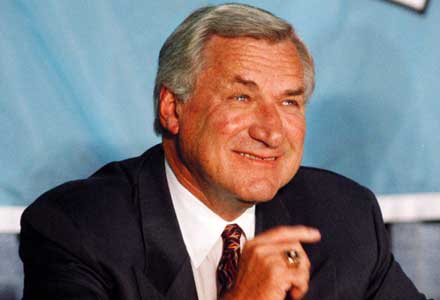Dean Smith’s courage
Carolina's legendary basketball coach Dean Smith will receive the Presidential Medal of Freedom, the nation’s highest civilian honor, from President Barack Obama.

Bill Guthridge struggles to put his feelings into words.
Every week, he sees his longtime friend and former boss in the office, as he has since he joined the coaching staff of the Carolina basketball team in 1967.
He and former head coach Dean Smith worked together longer than most marriages last. And in a way, they raised a family as well, connected by an unusual, unbreakable bond.
“He is a great man and it was great to be with him,” Guthridge said. “I think all the players who have played for Dean Smith and I appreciate what he did for them, and for basketball, and for Carolina. It was something to be able to see that through all the years.”
Guthridge can accept that those years are history. When he and Smith came to Carolina from Kansas, neither dreamed that they would build a basketball program that would become a sports dynasty – as respected by Carolina’s foes as it was beloved by its legion of fans.
What is harder for Guthridge to take is that his friend is no longer fully here. The legendary memory – that indispensable instrument behind Dean Smith’s genius and charm – is gone now, too.
Smith had a way of making people feel that they mattered to him, that they were as important to him as he was to them, just by taking the trouble to remember their names, Guthridge said.
“He had a real gift.”
“He had a real gift,” Guthridge said. “Many times, he and I would be walking to the locker room and somebody would approach us. Before the person opened his mouth, Dean would say, ‘Hey, Joe, how are Mabel and the kids doing?’ It has been so sad to see that gift deteriorate over the past six or seven years.”
On November 20, members of Smith’s family will be present for him at the White House when President Barack Obama awards Smith the Presidential Medal of Freedom, the nation’s highest civilian honor.
As a teacher, Smith was a model of integrity; as a political activist, he exemplified social and moral conscience.
Other than his wife, perhaps no one knows that side of Smith better than Robert Seymour, who was pastor of the Olin T. Binkley Memorial Baptist Church for 30 years. Seymour met Smith when he came to Chapel Hill in 1959 to help found the church.
At the time, Smith was in his second year as an assistant coach under Frank McGuire. He joined the church in its first year, primarily because it included everyone, Seymour said.
In 1959, Chapel Hill still had a segregated school system, and it wasn’t until 1961, the year Smith took the reins as head coach, that the system would become the first in the state to activate a plan for voluntary integration.
“People think of Chapel Hill as this liberal place, but back in the late 1950s and early ‘60s, it was as rigidly segregated as Mississippi,” Seymour said.
A few years later, people staged marches and sit-ins to integrate restaurants and movie theaters, but The Pines restaurant on Franklin Street, where the basketball team ate its program meals, was already integrated.
Smith, when he was still an assistant coach, walked to the restaurant with Seymour and a theology student from Binkley, who happened to be black. Then they did something radical for the day: The three stood by the door waiting to go inside.
“The manager looked through the door and saw that we were there,” Seymour said. “There was a look of consternation, but the door finally opened and we were served like everybody else.”
Integrate the ACC
Smith’s next big church assignment came a few years afterward, Seymour said. “We said, ‘Dean, your assignment is to find the best black player you can find and integrate the ACC.’”
In 1966, Charlie Scott became the first African-American scholarship athlete at Carolina.Coach Smith acknowledges cheers from the crowd after receiving an honorary Doctor of Laws degree during UNC’s 2007 commencement exercises.
Smith continued to support civil rights, champion education and fight against the death penalty for the rest of his public life.
In the 1960s, he protested the Vietnam War; in the early 1980s, he recorded radio spots to promote a freeze on nuclear weapons; and in 1998, he appeared at a clemency hearing for a death-row inmate and told then-Gov. Jim Hunt, “You’re a murderer. And I’m a murderer. The death penalty makes us all murderers.”
Fred Hobson, a retired UNC English professor who played on the all-white freshman basketball squad the same 1961–62 season Smith took over as head coach, said Smith got involved “not because he wanted to necessarily, but because he felt he had to. His father had led school integration in Kansas when he was growing up and carried that same deep sense of moral right and wrong. He simply had a firm desire to do the right thing and take a leadership role. ”
That sense of right and wrong led Smith on and off the court.
“To be quite frank,” said Hobson, “many of the people who idolized him in the state did not know his politics and would not have agreed with them if they had. So what everyone saw in him was not his politics. It was simply his leadership – that calm in the face of crisis.”
See also: Lucas: An American Hero (Originally published Nov. 11, 2013)




